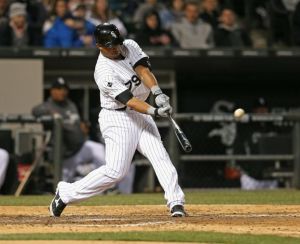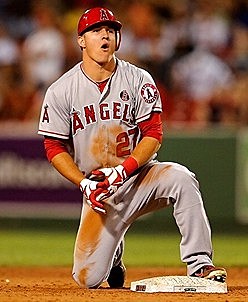What a summer it's been. There was a fair amount of parity in Major League Baseball, and it's nice to not have a New York or Boston team in the playoffs (so the East Coast bias can go away for one October). As a Cubs fan, I expected nothing this season. But they overachieved in the first year under Rick Renteria, and we got to see glimpses of the future. I look forward to next April/May when Kris Bryant gets his call.
But for 2014, no teams lost 100 games, and nobody won 100 games; it's the first time since 2007 that this has happened. It took until September 15th for the first playoff spot to be claimed, as the Angels rode a hot second half to a berth. The next day, the first divisions were claimed as Baltimore and Washington got to crack open some champagne. By the start of the final week, only half the spots were claimed. It made for a fun final week.
This season, I only got to one big league game, as
my wife kidnapped me to go to Wrigley. This marks the only the second year (the other was 2008) that the Cubs had a sub-.500 record at games I attended, and the first time they went winless. I also didn't get to see Javy Baez in person. Next year, baby.
So with 2014's regular season in the books, it's time for me to hand out awards. For the most part,
my votes have concurred with the official results
in years past. I'd be willing to bet they'd do so again this year. Let's take a look.
Manager of the Year
American League
 |
| Photo from ESPN.com |
Buck Showalter, Baltimore Orioles:
96-66 (1st in AL East), 25 wins above COAS prediction. I said in March that
if there was one pick I'd be most likely to miss, it'd be Baltimore. The O's were red hot for much of the season, especially during the summer. He had his squad in contention for the best record in the American League for much of the season, and I would argue with less talent than the Angels, who finished with the best mark in baseball, had.
National League
 |
| Photo by Rob Carr (Getty Images) |
Matt Williams, Washington Nationals:
96-66 (1st in NL East), 3 wins above COAS prediction. I had Washington winning the NL East, so it's not like they weren't expected to bounce back, but he took a squad that didn't has as much talent as, say, the Dodgers, and posted the best mark in the National League. He had this team running away with the division, and they were one of the first to clinch.
Rookie of the Year
American League
 |
| Photo by Jonathan Daniel (Getty Images) |
Jose Abreu (1B, CHW):
142 G, .316/.381/.580, 35 HR, 35 2B, 2 3B, 105 RBI, 79 R, 3 SB. And it's not even close. While much of the baseball talk in Chicago was around the Wrigley renovations and the trickling in of the future on the North Side, the White Sox showed some promise in their own future. The Cuban prospect took the starting job this year over the outgoing Paul Konerko and showed immediately that he belongs. He's near the top among AL rookies in batting average, and leads in homers, doubles, RBI's, and OPS by a landslide, all while contending for the AL batting title. There were some good rookie pitchers (the Yankees' Masahiro Tanaka and Matt Shoemaker of the Angels), but they didn't put up quite the numbers pitching that Abreu did at the dish.
National League
 |
| Photo by Mike Stobe (Getty Images) |
Jacob DeGrom (SP, NYM):
22 G (22 starts), 9-6, 2.69 ERA, 1.14 WHIP, 140.1 IP, 43 BB, 144 K, .228 BAA, .613 OPSA. This one, at a glance, wasn't quite as obvious. Billy Hamilton brought blazing speed to the Reds this year, stealing 56 bases, but he only hit .250 and your leadoff hitter should get on base more than 29 percent of the time. The homer in me wants to go with Jorge Soler, but he only played in 24 games, so that's out. DeGrom didn't do enough to qualify for any titles, but he had a solid ERA that would have finished in the top 10, and kept walks to a pretty good minimum. I'm hard pressed to find a better candidate.
Cy Young Award
American League
 |
| Photo from the Associated Press |
Felix Hernandez (SP, SEA):
33 G (33 starts), 15-6, 2.14 ERA, 0.92 WHIP, 236.0 IP, 46 BB, 248 K, .200 BAA, .546 OPSA. This is actually a pretty close race. Cleveland's Corey Kluber has really good numbers (34 starts, 18-9, 2.44 ERA, 1.09 WHIP, 235.2 IP, 51 BB, 269 K, .233 BAA, .624 OPSA), and despite missing a chunk of time, so does White Sox ace Chris Sale (26 starts, 12-4, 2.17 ERA, 0.97 WHIP, 174.0 IP, 39 BB, 208 K, .205 BAA, .567 OPSA).
Until last Tuesday, it looked more like Felix would run away with the award, and really only kept the ERA title thanks to a scoring change. Kluber led the American League in punchouts, but Felix has a better WHIP, BAA, and OPSA. Even with the loaded ballot, I give Felix Hernandez the edge, but I would have no problem with Kluber, or even Sale winning the award. All three will get some first place votes.
National League
 |
| Photo from Major League Baseball |
Clayton Kershaw (SP, LAD):
27 G (27 starts), 21-3, 1.77 ERA, 0.86 WHIP, 198.1 IP, 31 BB, 239 K, .197 BAA, .523 OPSA. When I'm sharing this on social media, part of me wants to put a "#Cardinals" on it, just to get a rise from the so-called "Best Fans in Baseball". (Side note: If you have Twitter, give
@BestFansStLouis a follow. It's comedy gold.) This fan base has idiots who are all but screaming that Adam Wainwright should win the Cy this year. Don't get me wrong, he's had a good year (32 G, 32 starts, 20-9, 2.38 ERA, 1.03 WHIP, 227 IP, 50 BB, 179 K, .222 BAA, .580 OPSA).
But compare those stat lines. The only advantage Wainwright has is in innings and starts (Kershaw missed like a month due to injury). In those six extra starts, Wainwright picked up about three walks per game in a little over six innings, and has way fewer strikeouts. The only real other case Wainwright has is his league-leading 12 starts going at least seven innings without allowing a run (Kershaw has seven such starts). But the overall body of work isn't even close. It's Kershaw, then everyone else. (And to answer the two most common complaints by Cardinal fans, past and current postseasons have no bearing on this award, and of Wainwright's two rings, the first saw him in the bullpen and he was hurt for the second.)
Most Valuable Player
American League
 |
| Photo by Jim Rogash (Getty Images) |
Mike Trout (OF, LAA):
157 G, .287/.377/.561, 36 HR, 39 2B, 9 3B, 111 RBI, 115 R, 16 SB. Okay,
Jeff Passan needs to shut up now, even though this award is closer than his man crushing will ever admit. I'm on record in both 2012 and 2013 saying that Miggy deserved the award both years over Trout. This year, there are some holes in the Trout argument. He struck out 184 times, which is a lot, but Sammy Sosa struck out 171 times in 1998 when he won NL MVP (then again, he hit 66 homers that year). Trout also finished hitting below .300, but was 14th among all qualifiers, so it's not like he was terrible.
So who would keep him from winning the trophy? Detroit's Victor Martinez had a monster year (151 G, .335/.409/.565, 32 HR, 33 2B, 103 RBI, 87 R, 3 SB), leading the AL in OPS, and striking out a mere 42 times while being issued 70 free passes. Problem is, he played DH, and while great, his numbers weren't otherworldly. Then when you combine his production with a "down year" for Miguel Cabrera (159 G, .313/.371/.524, 25 HR, 52 2B, 1 3B, 109 RBI, 101 R, 1 SB), who was really more valuable to the team? Both their teams made the playoffs, so either one has a decent argument. The Angels were better though, and the best teammate Trout had was probably Albert Pujols, who had a somewhat pedestrian year (159 G, .272/.324/.466, 28 HR, 37 2B, 1 3B, 105 RBI, 89 R, 5 SB). This time, Trout earned it.
National League
 |
| Photo by Stephen Dunn (Getty Images) |
Clayton Kershaw (SP, LAD):
26 G (26 starts), 21-3, 1.77 ERA, 0.86 WHIP, 198.1 IP, 31 BB, 239 K, .197 BAA, .523 OPSA; .175 BA/.235 OBP/.206 SLG, 3B, 3 RBI. This isn't unprecedented; Justin Verlander won the 2011 AL MVP award, but the last National League pitcher to pull it off was
Bob Gibson in 1968. Part of the reason is the argument that since starting pitchers only play in about 30 games a year (give or take), they don't have the same impact as position players. But Kershaw faced 749 batters this season, while the Major League leader in plate appearances (Ian Kinsler) had 726.
So who are the biggest threats to Kershaw's chase for multiple trophies? I think first and foremost is defending MVP Andrew McCutchen of the Pirates (.313/.408/.545, 25 HR, 37 2B, 6 3B, 78 RBI, 86 R, 17 SB), who has led his team to their second straight playoff berth after a 20 year absence. This is a good line, but I'm not totally sold on it being MVP-worthy. The other main competitor is Giancarlo Stanton of the Marlins (.288/.395/.555, 37 HR, 31 2B, 1 3B, 105 RBI, 89 R, 13 SB), who has missed the last few weeks after being hit in the face by a pitch. I'm not holding the injury against him (both Kershaw and McCutchen also missed time this year), and his numbers are really good, but his team wasn't great. I know, the MVP is supposed to be an individual award, but I think contributions to your team are important. The biggest stat for me: in Kershaw's 27 starts, the Dodgers went 23-4 (the Dodgers went 71-64 in all other games). He had just three starts where he didn't go at least six innings (two of those were five-inning outings, and the other was that random shellacking by the Diamondbacks in May), and a total of five outings where he failed to go at least seven innings. Wow.









No comments:
Post a Comment